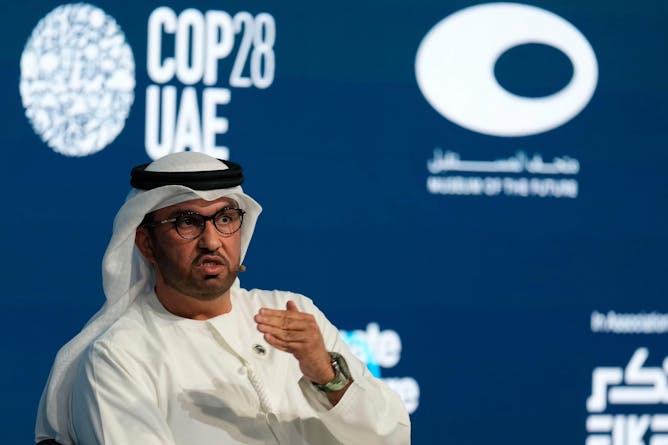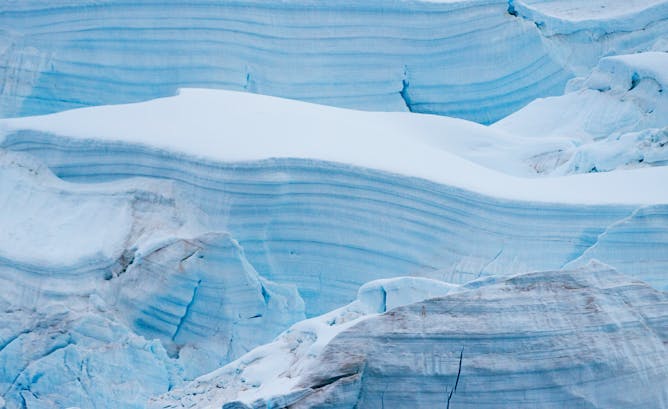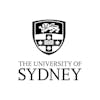|
In the movies, humanity rises to existential threats in stirring ways – firing Bruce Willis at an asteroid or overcoming differences to fight aliens.
In reality, the fight against our very real existential threat – climate change – happens far less dramatically. The latest installment will start this week, at the COP28 climate talks in Dubai.
Negotiators gather in large meeting rooms or break off for quieter side talks. The world’s small island states – who have done least to fuel climate change and who will suffer perhaps the most – will band together to press the major industrial powers to move faster. Big fossil fuel exporters may try to slow talks. The president of this year’s talks heads up the UAE’s state oil company.
The goal is consensus. A single nation out of the 198 attending can stop an agreement. Will the world’s nations agree to wording like “phasing down fossil fuels” or will the word “unabated” be inserted, to leave room for controversial carbon offsets? Then there are the substantial issues. Who pays for climate damage, given developing nations get hit hardest but often don’t have the funds to rebuild. Will the long-sought Loss and Damage fund become reality?
As climate expert Brendan Mackey writes today, these issues will be hashed out even as the world coasts towards unenviable new records. 2023 is almost certain to be the hottest year on record. For a few days in November, the average sea surface temperature was 2 degrees hotter than the preindustrial period. Enormous floods and fires everywhere from China to Canada to Libya have made world news. Climate denial is on the wane. There are at last welcome signs of
progress on clean energy.
The question now is – will talking trigger the rapid, sweeping changes we need to avert this very real existential threat?
|

|
Doug Hendrie
Deputy Environment + Energy Editor
|
|

Brendan Mackey, Griffith University
In what’s likely to be the hottest year on record, nations are gathering to try and hash out faster action on climate change. Here are the three main issues facing negotiators.
|

Emilie Rutledge, The Open University; Aiora Zabala, The Open University
UAE will preside over talks to limit climate change – despite revelations it plans oil deals.
|

Timothy Naish, Te Herenga Waka — Victoria University of Wellington
The world is on track to exceed 2°C warming within the next five years, with dire consequences for polar ice, mountain glaciers and permafrost – and human society.
|

Daniel Ghezelbash, UNSW Sydney; Anna Talbot, UNSW Sydney
The High Court judges unanimously held that a person must be released from immigration detention where there is no real prospect of them being deported in the foreseeable future.
|

Michelle Grattan, University of Canberra
The government will urgently legislate after the High Court on Tuesday outlined its reasons for its decision that indefinite immigration detention was unconstitutional.
|

Denis Muller, The University of Melbourne
Hundreds of Australian journalists signed an open letter to news organisations calling for better coverage of the war. It calls their impartiality into question.
|

Peter Martin, Crawford School of Public Policy, Australian National University
Sure, a good many of us don’t trust politicians – but surely politicians ought to trust politicians. History shows why they might one day need to overturn a Reserve Bank decision.
|

Luke Grzeskowiak, Flinders University; Hannah Jackson, University of Technology Sydney
The first report linking thalidomide to birth malformations was made by Australian doctor William McBride. The drug led to thousands of instances of pregnancy loss, neonatal deaths and disability.
|

Saul Karnovsky, Curtin University
Take a few minutes out of your day and write something meaningful to thank your child’s teacher.
|

Luca Peruzzotti-Jametti, University of Cambridge; Stefano Pluchino, University of Cambridge
Fifteen patients receiving an experimental stem cell therapy to treat advanced MS didn’t have the expected deteroriation in their condition.
|

Elizabeth Wells, University of South Australia
People receiving cancer treatment can struggle to read. An innovative form of bibliotherapy brought joy and solace, enabling patients to concentrate as listeners, rather than readers.
|
Politics + Society
|
-
Michelle Grattan, University of Canberra
Labor Senator Pat Dodson, will retire on Australia Day next year at age 75 due to ongoing cancer treatment affecting his health.
|
|
Health + Medicine
|
-
Stephen Duckett, The University of Melbourne
How does Australia’s health care system compare to our peers in the OECD? Here we highlight five charts showing Australia’s relative performance.
|
|
Science + Technology
|
-
Chris Ellis, University of Sydney
Science is essential for human flourishing. So why does so much science communication paint a bleak, nihilist picture of the world?
-
Guido Carim Junior, Griffith University; Chris Campbell, Griffith University; Elvira Marques, Griffith University; Nnenna Ike, Griffith University; Tim Ryley, Griffith University
Takeoff and landing are among the most difficult tasks commercial pilots perform.
|
|
Environment + Energy
|
-
David John Eldridge, UNSW Sydney; Andrew Macintosh, Australian National University; David Alan George, Griffith University; Don Butler, Australian National University
Carbon credits must be scrutinised – and none more so than credits for taking grazing animals off arid rangelands.
-
Alan Brent, Te Herenga Waka — Victoria University of Wellington
Using a ‘grid of grids’ network, New Zealand’s growing electric vehicle fleet could contribute to national energy resiliency, feeding electricity back into the system during peak demand.
|
|
Arts + Culture
|
-
Dominic Redfern, RMIT University
London-based experiential art collective Marshmallow Laser Feast’s Works of Nature is clearly in the business of knowledge transfer: it tells, it doesn’t ask.
-
Alexander Howard, University of Sydney
The serious and subtle aspects of The Seagull – many of which continue to resonate today – are lost in this new production.
|
|
Business + Economy
|
-
Isaac Gross, Monash University
Treasurer Jim Chalmers has made the first ever Reserve Bank appointment from outside the country as part of an effort to fight ‘groupthink’.
|
|
| |
|
|
|
Auckland University of Technology
Auckland, New Zealand
•
Full Time
|

|
|
The Conversation AU
Melbourne VIC, Australia
•
Full Time
|

|
|
The Conversation AU
Melbourne VIC, Australia
•
Full Time
|

|
|
The Conversation AU
Melbourne VIC, Australia
•
Full Time
|

|
|
|
|
| |
| |

|
| |
| |
| |
Featured Events, Courses & Podcasts
|
View all
|
|
1 January 2023 - 7 October 2026
•
|

|
2 December 2023
•
The University of Sydney
|

|
|
|

|
14 - 15 December 2023
•
Perth
|

|
|
|
|
| |
| |
| |
| |
| |
|
|